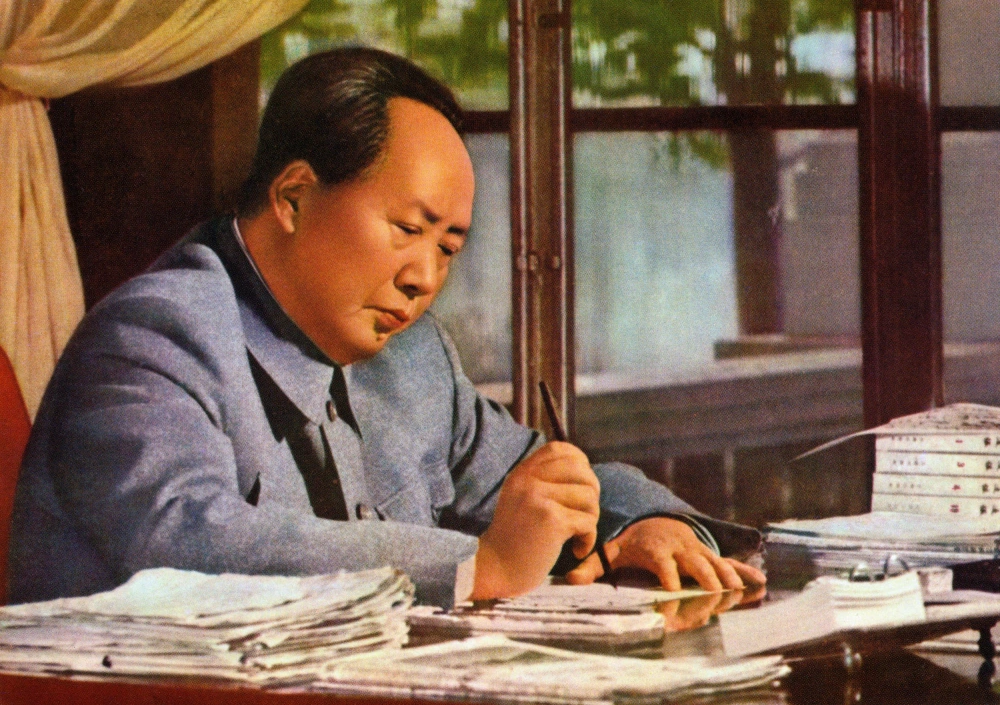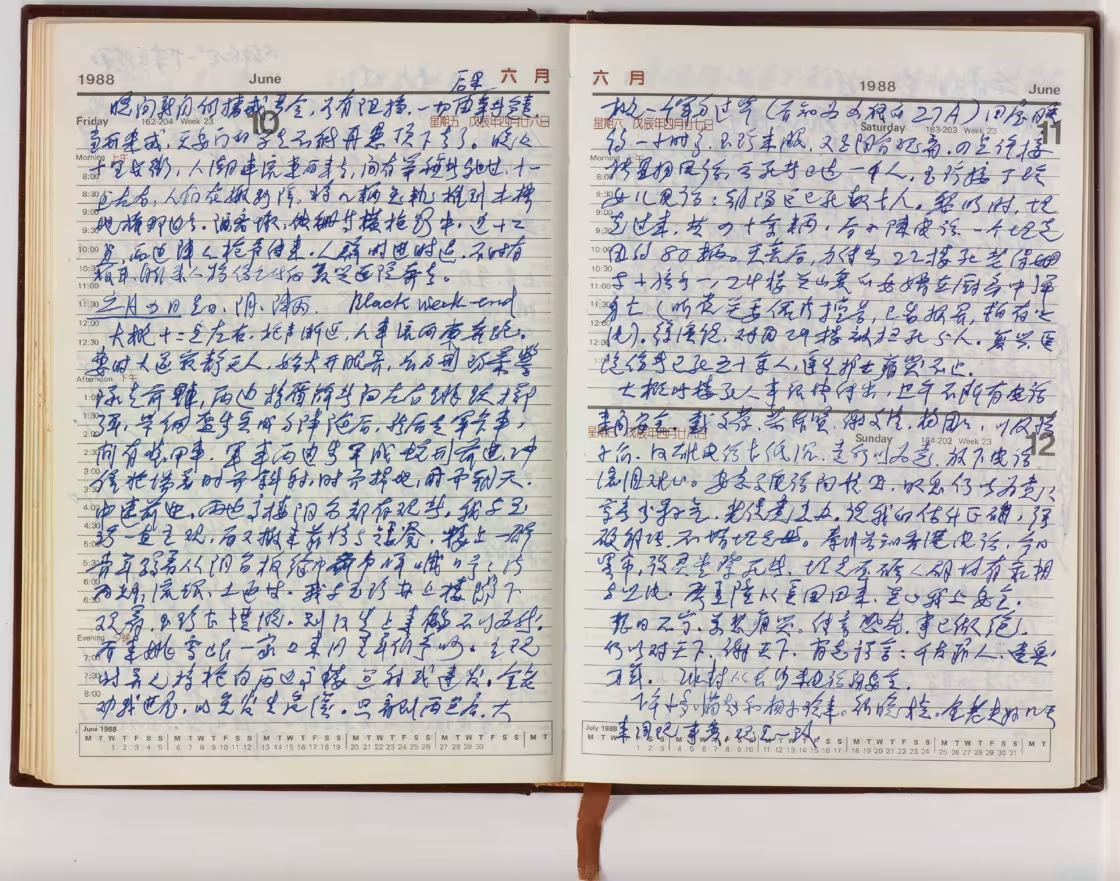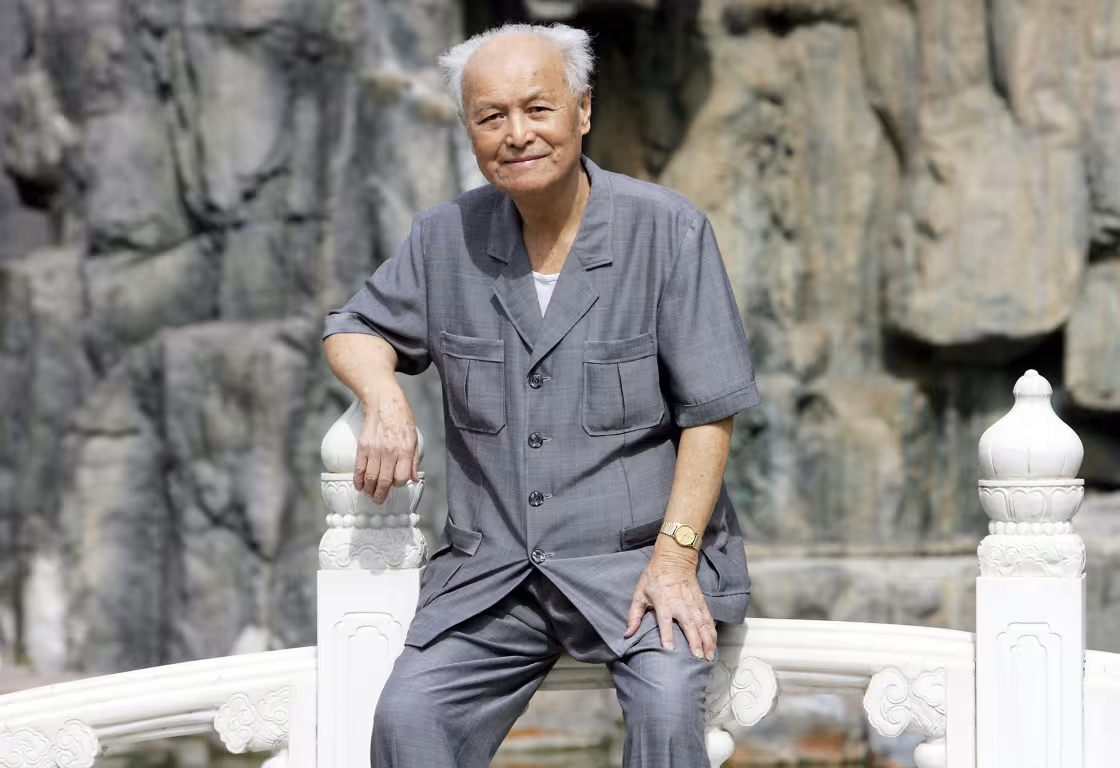Stanford University is suing the widow of top Chinese official Li Rui for ownership of the diaries, which academics fear would be censored by the Chinese Communist Party.

HONG KONG — The diaries of a top Chinese official and prominent critic of Beijing are at the center of a U.S. legal battle, raising questions about who will write the history of modern China.
Li Rui, who died in 2019 at the age of 101, held a number of important positions within the ruling Chinese Communist Party, including personal secretary to longtime leader Mao Zedong. In detailed handwritten diaries he kept from 1946 to 2018, Li recorded his experiences and observations during seven tumultuous decades of Communist Party rule — a version of events that might conflict with the official party line.
As a high-ranking official, Li was an authoritative witness to parts of history that the party would rather not highlight — from internal disputes and policy missteps to the deadly Tiananmen Square crackdown — because they challenge its narrative of uninterrupted prosperity and political unity as China rose from a poor and isolated nation to become the world’s second-largest economy.
A trial that began in California on Monday will decide whether Li’s diaries should remain at Stanford University’s Hoover Institution, where his daughter donated them, or be returned to his elderly widow, who has been accused of acting as a front for Chinese authorities who would most likely censor them.
“We’ve never had something like this before,” said Joseph Torigian, a research fellow at the Hoover Institution.
“These are diaries and personal papers that run to dozens and dozens of boxes that talk about everything from the early years of the revolution to Li Rui’s work as a secretary to very powerful individuals, including Chairman Mao.”
Few top Chinese Communist Party officials have kept such detailed diaries, especially after the Cultural Revolution of the 1960s and 1970s, when they were used as evidence for political persecution.
“It is very hard to study the People’s Republic of China because it is an authoritarian regime that believes that different narratives about its past are very dangerous for regime security, which means that they run a tight ship,” said Torigian, who is also an assistant professor at the School of International Service at American University.

Stanford says Li had directed his daughter, Li Nanyang, to donate the materials to the Hoover Institution, which is known for its large archive of historical materials on modern China, for fear they might otherwise be destroyed by Chinese authorities as part of a crackdown on dissent he saw growing worse under President Xi Jinping.
Li Nanyang, a vocal critic of the Chinese Communist Party who lives in the United States, carried most of the diaries out of China in 2017. She made the donation to the Hoover Institution official days before her father’s death in 2019, once she felt he was safe from possible reprisal.
Shortly after that, Li’s second wife, Zhang Yuzhen, sued for the return of the original diaries, which she says are rightfully hers. Her lawyers argue that they contain deeply personal information about her relationship with Li, and that the violation of her privacy has caused her emotional distress.
A Beijing court found in favor of Zhang, a ruling Stanford says cannot be enforced because it was denied the opportunity to appear in court and defend itself. The university has sued Zhang in California in return.
Lawyers for both sides say their claims are buttressed by comments Li made in his diaries and in interviews about what he wanted to happen to his writings and who should represent him.
But given that Zhang is now in her 90s, questions have been raised about whether the lawsuit was her idea.
“She will not be capable of making money or contributing money for a lawsuit or to pursue the return of the diary,” said Feng Chongyi, an associate professor of China studies at the University of Technology Sydney, who met regularly with Li.
Only the Chinese Communist Party, he said, has “the resources, the money and the political will to do that.”
Zhang’s lawyers have said that she is acting alone. The Chinese Foreign Ministry did not immediately respond to a request for comment on Friday.
Feng and others worry that Chinese authorities would severely restrict access to any diaries by Li, a longtime critic of the party’s leaders and policies, whose writings were banned in China in 2006.
Li joined the Chinese Communist Party in 1937 at the age of 20, rising through the ranks as it defeated the existing government in a civil war to gain power in 1949. By 1958, Li had become Mao’s personal secretary.
But he was expelled from the party the following year over his criticism of the Great Leap Forward, an industrialization program championed by Mao that led an estimated 30 million to 40 million people to die of starvation in three years. During his 20 years in exile, Li was imprisoned in a labor camp and spent eight years in solitary confinement.
He was reinstated to the senior party ranks in 1979, three years after Mao died. In the 1980s, Li worked in the party’s powerful Organization Department, which is responsible for the appointment and promotion of high-ranking officials.
Li was also highly critical of the Chinese government’s deadly crackdown on pro-democracy protests in 1989. From the balcony of his apartment in Beijing, he could see soldiers firing on protesters in and around Tiananmen Square in what he described in English as “Black Weekend.”
His diaries, Torigian said, reveal “his thinking as well as a lot of other very senior revolutionary elders during that crisis,” public discussion of which is suppressed in China.
 (Li Rui at age 89 in 2006)
(Li Rui at age 89 in 2006)
In his later years, Li was a leader of a group of pro-reform elder intellectuals in Beijing, “and there are details about his interactions with that circle as well,” Torigian said.
“So the breadth and the detail are really something that are quite unprecedented for the study of politics and the Chinese Communist Party,” he said.
Though the Hoover Institution has scanned copies of the diaries, archivists and historians say it’s important to retain the original materials as well, both for research purposes and to reinforce the authenticity of the scans.
“The Communist Party of China has a history of altering materials in order to fit what it wants the version of history to be,” said Perry Link, a Sinologist and emeritus professor of East Asian studies at Princeton who testified at the trial last week.
If scholars publish research based on the Hoover copies but the originals are in Beijing, “the government in China can say, ‘No, your conclusions are wrong, you worked from the wrong materials. We have the originals, and that’s not what they say,’” said Link, who is also a professor at the University of California, Riverside.
With the originals in their possession, party elites could release them selectively to support their preferred narratives “and might even change what’s in the diaries,” he said. “They’ve done this before.”


Weird how the actual content of the diaries is never mentioned, just an absolute certainty that it makes China look bad.
Notice the narrative framing here. There is zero evidence that any “reprisal” was in the works, other than gusano FUD conspiracies. Gusano feelings are treated as unimpeachable fact. No evidence = China hid it very well
What a surprise, more racist “savage natives incapable of caring for their own artifacts” shit.
The perfidious Chinese are a hivemind incapable of making decisions for themselves. I am not racist!
This is just factually untrue lol. Also fun fact, baseless conjecture by some gusano professor doesn’t qualify as evidence.
Fun fact: nothing in this paragraph supports the assertion that this is going to happen, other than the “worry” of gusanos which is, yet again, treated here as unimpeachable fact
So why don’t you quote from this extremely compromising diary instead of vaguely alluding to it and insisting that it will end the seeseepee?
Really buried the lede on this one. Spent paragraph after paragraph fearmongering that the seeseepee was going to censor and destroy this information, implying the physical diary was all that was banging in the balance, only to reveal at the end that they have multiple scanned copies and it literally wouldn’t matter if the diary exploded into a billion pieces overnight.
Projecting real hard there, Professor Link. By the way it would be nice if you listed concrete examples. Also the impact of this dire warning is extremely dampened by the fact that it was revealed one paragraph ago that they have copies of the original and any alteration would be easily caught, so it doesn’t matter what happens to the original.
Love to treat FUD conspiracies by crank professors as fact. Also, there is just as much evidence that China is going to alter the diary as there is that the Hoover whatever-the-fuck has already done so themselves. After all, they have a history of distorting Chinese history, so how can we really trust what they say? Why should we trust the Hoover Institution over the Chinese government?
Concrete examples? No? And again, it literally doesn’t matter what they do or don’t disclose considering you have COMPLETE COPIES OF THE FUCKING ORIGINAL. And pretty ironic to hear whining about selective disclosure from an article that hasn’t quoted a single sentence from this highly compromising and incredibly damaging diary and which backs up its claims with nothing but fearmongering paranoia from NED School of Fascism professors (trust me, they are all like this).
So in the end, what did we learn? That the entire premise of this article, that the information in the diary is hanging in the balance and might be lost forever should China get their hands on it, is complete and utter bullshit. There is no “battle over the history of modern China”.
Let me repeat again for the people in the back: THE HOOVER INSTITUTION HAS COMPLETE COPIES OF THE ORIGINAL. IT DOESN’T MATTER AT ALL WHAT HAPPENS TO THE PHYSICAL DIARY.
Edit: And as per Awoo’s reply below, the Hoover Institution refuses to publish the contents of the diary while whining about how China is going to censor it. They are the only party in the entire story that we have concrete proof of engaging in censorship and selective disclosure, putting a narrative spin on a document they won’t show us or even quote from.
Remind me why we should trust them over some scary hypothetical future censorship and distortion by China? Hoover is doing it right here and now.
Also bonus points for the respecters of norms and institutions ignoring a court order because of their absolute contempt for China.
This entire article is literally just this meme:
I think my favourite part of this is that they’re worried about censorship by the “chinese communist party” (shibboleth)… But are these diaries accessible to the public? Has Hoover Institute made them public? Not that I can find.
Seems like Hoover is doing the censoring and is holding this information hostage, and that China is the only hope that the public will ever get to read it. I don’t trust the Hoover Institution not to alter and selectively disclose the contents.